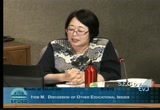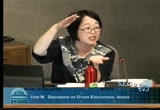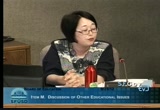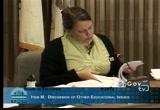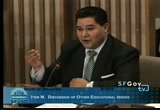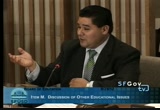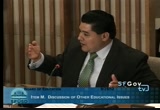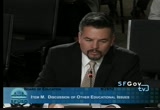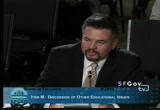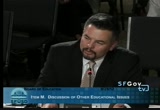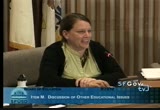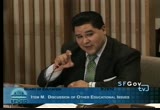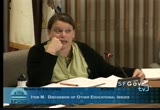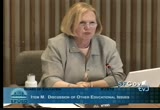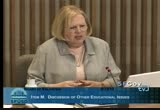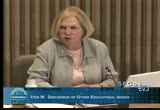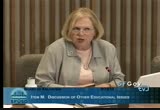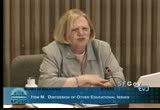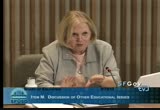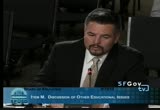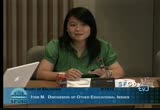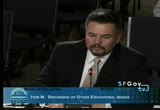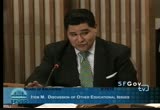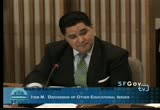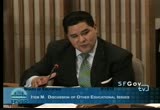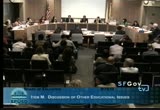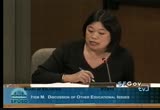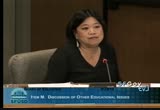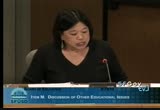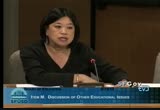tv [untitled] October 1, 2012 1:30am-2:00am PDT
1:30 am
in the recent time period that these scores are remarkable. really rationally the scores should be going down; right? because we have 25 less resources. we have forced closure dispais layoffs and defies logic that the test scores are moving in the right direction and i really want to think and it's possible only as the commissioner pointed out and the blood and sweat of the tears of parents and peers and students and before my comment on the scores i want to congratulate you on the drop of suspension rates and they're deathly. are you removing kids from a learning environment and giving up on them and bringing that down to 4% is really huge and i attribute that to board leadership and restorative practices, leadership at the school sites and to principals
1:31 am
and claudia anderson and her team. finally on the test score what is is really clear to me is the achievement gap just persists so in our district the average in english is about 61% of proficient or above which is okay. that's two out of three kids that are proficient or above but we have some groups performing at 85% and some at 35% and one in three proficient or above is just not acceptable. nobody can really say that proclaims success and only one in three this a sub group are proficient and above and math 68% and pretty good overall. we have some students performing at 89% and others at 40%, just two out of five. to close this gap with single dkg itd growth
1:32 am
would take 20 years we don't have 20 years so what is really clear from the data is the investment in the superintendent zone, with the school improvement grant, the infusion of money is relating in double digit growth which is what we have to see to bring up the under performing sub group so again to reiterate the superintendent's thought for the evening. we have a very important opportunity in november to increase the funding because without funding of public education we are never going to be see the gains we need to see with this these sub groups. >> commissioner norton and wynns. >> so i had a couple of questions and i want to echo all everything that has been said before about people doing the work out in the schools and the progress we're making it it's
1:33 am
wonderful. i was curious where you know superintendent in your remarks you said "it's doable to close the gap because some of the schools are making such tremendous progress and we called them out and called specifically some of the schools" and commissioner murase makes a great point about funding but when you listed some of the simple strategies going forward some of them match what the high leverage strategies that the principals gave us and some didn't and since we know in some of the schools where this incredible acceleration is going what are we doing to replicate what is happening there across the district? >> it's a very insightful question. i will take the first piece of it and then i will ask deputy superintendent to also chime in. we need to be honest with the public and be honest
1:34 am
with ourselves and we have perpetuated in our school system not unlike large urban school systems and practices and systems that for years have served some of our students well and some of our communities well, and we talked about going deeper and further we're talking about disassembling some of those systems. for example who gets into an ap class? who gets into an algebra class? there are schools for good and well thought out and historical reasons figure there are certain requirements that students must need to be able to go into an eighth grade algebra class so we're are challenging those assumptions and asking ourselves does it really make a difference or not? that's just one example. the other example that we have to be honest with ourselves about is we're moving from a confederation of
1:35 am
independent schools chrksz means for many years schools had tremendous autonomy to do what they wanted to do that serves their communities to a unified school system, and we're not moving in this direction because we had the bright idea to do it, but we're hearing from the teachers in the field that say "we need support. we need resources. we need help with a core curriculum that makes sense that we're part of" so we 200 teachers helping to right the core curriculum for example. we have teachers involved in developing the assessments given in the early grades and the pre-k. we have teachers involved with the professional development. we are not where we want to, but we're moving from a system that says as a school district there are certain things we believe and
1:36 am
hold as true. one is we have support for the priority work for the district that will look pretty common for everyone and we're going to challenge systems where we have data to show that sub groups of students are not successful and what that means they're going to be some push back and if you remember i talked about the elasticity of the status go and that is very simply as we push against the systems that have benefited some groups and not benefited other groups there's an elastic that is getting stretched and at some point we either break free from the status go that kept kids performing sub standard or that elasticity is going to bring us back to the status go and will have achievement gap that persists in our district so from the 20,000 level that's the battle we're fight interesting we have more and more allies
1:37 am
everyday in the classroom that are fighting that with us. i think the superintendent wanted to add a piece to it. >> i think that is the key question and what are strategies? what are lessons learned? how can we apply that to the next level of schools that need enhanced support and we know we want the professional learning to be job embedded so providing teachers with the time to collaborate, to have the opportunity to come back a few days early in the summer, to really map out their lessons for the semester. making sure that our teachers are on top of the shift to the common core state standards. making sure they're
1:38 am
understanding our district's new core curriculum. that they have some facilitated discussions around student work and student data. having enhanced supports at the school level with other teacher leaders like instructional coaches in literacy, in mathematics. focusing not just on standards but also instruction, so a balanced literacy approach for example. strategies that permit differentiated direct instruction for specific students. we also know in the superintendent zone that paying attention to extended learning opportunities aligned after school programming, summer school opportunities, taking the community schools approach that takes a look at a broader diagnoses of the school's needs so taking advantage of some community partnerships and whatever we can apply to ensure that there's a repertoire available to school communities
1:39 am
like mental health partnerships, some student supports available to students and families in need are just a couple of elements that have been part of the package in superintendent zone especially sig schools. we know that resources matter and they make a difference, but if they're invested wisely and there's a clear strategy behind them with a reminder that the sig funds allowed us to enjoy a per pupil expenditure that matches a lot of east coast districts typically, so it has allowed us to bring on the additional personnel to work with teachers focused on building their capacity as teachers because they will be gone in june unless we find a way to find on to that expertise we have developed. >> yeah. i mean that's the crux of what i was hoping you wouldn't say actually. i guess
1:40 am
what i am worried about is that we have seen -- we've seen this incredible progress at some of these schools because of the additional resources, invested wisely and doing the right things, and then how do we -- without those resources replicate that progress? i mean do we also have a corresponding list of things that we should probably stop doing at some schools? maybe that's not the question you want to answer yet. i don't know. >> well, commissioner norton i mean that's a whole another committee of the whole but i will tell you that yeah. yes, we are identifying the list of things we need to stop that we don't have evidence that is having impact on student learning. i think the inefficiencies we talked about moving from a confederation of independent will schoos to a unified school district there are infshseses we can realize
1:41 am
in a unified approach to student learning. not based on a consultant that comes in and says what we should do. based on the work of our teachers and principals and our communities in our neighborhoods in our schools in our city. we know what we need to do. the challenge that we have is institutionalizing that learning and bringing others on board to understand how they can have an impact. i am very happy to say that that process hasn't really stopped and deputy superintendent yee and his group of smart team members have already met around that question. what is effective? what do we continue to fund? and what do we propose to the board that we discontinue funding in terms of really using our ponies wisely to fund what we know is effective. >> commissioner wynns. >> i'm sorry. i have one more
1:42 am
question. >> okay. go ahead. >> oh i know what i wanted to sc. just as a corollary. katie francis gave me some data and there's some issues on kids taking the cma, how many kids are taking it? you touched on some of this. i would like to see an analysis what is the use of the cma, particularly in the superintendent zone and does -- i mean the ideas -- has the bottom been sort of cut off in the superintendent zone as well as as she demonstrated in some of the district wide figures by putting kids into cma and is our use greater in the superintendent zones than the district as a whole? i know you don't have that at your fingertips but if i could get that i would be interested.
1:43 am
>> thank you. >> i actually wanted to ask a similar question to commissioner norton so follow up on the first question a bit. there are -- i mean that we know resources are important and we also know that this version of support for struggling schools will not look like this version after this year, and i carefully say that because when people say "oh what are we going to do when the sig money goes away? " . i have been saying to people and i think is true and there will be another version coming along from the state or feds on ways to target resources at the most struggling schools and i don't say that cavalierly. and some other money will come along. i am concerned that we need to make sure to continue this work not just because it's the right
1:44 am
thing to do and absolute necessity, but because i think that having seen version after version come i think one of the things we haven't done well is transition and be prepared knowing there will be some other form of this, and i think that we and everybody else by the way -- in fact i suspect that we're better at most of them, but still the starts and stops have tremendously negative effect and one which i think is amplifyd and not planning for it and not thinking. what is -- how can you sort of do these things and maintain them in some way and knowing which ones are most important and what form we can keep them going so they can be resourced in a more effective and quicker way, so that's one of my first questions. the
1:45 am
second one is about -- i would like to know and i think we need to discuss -- first of all it seems they fall into a number of categories so there is the tremendous investment in professional development. we understand that. there is things that we know, we want to and we want to now continue all the time that are structural improvements. things like linked summer school, longer strickennal time, the alignment of the after school programs and now we have an understanding what that could actually look like, so those things i think we in the community too especially the community with these schools, need to understand how we're going to make the tough decisions about what we continue in what way and with what resources and why? what's the evidence on which we're going to base those? which to me also includes the sort of
1:46 am
qualitative evidence, the experience of the people working in those schools, the students going to school there and the parents and families, and then i'm interested in the lessons that we have learned which you referred to that we think are transferable. what did we learn there that isn't so much just about money, but about doing things differently? that we can do differently if we should. i'm interested whether we think they're important and valuable practices and changes that will benefit everybody or what specificity they have in their alignment with the challenges of those schools in particular? so i think there -- okay. that's my first part. i don't expect you to answer those now but later. and my second question is about the achievement gap,
1:47 am
and i think this is going to take for all of us, but maybe start with a sit down with whoever might want to, but when i look at the numbers in the zone schools and in the sig schools and the improvements that we have seen and then the not only persistence but at exactly the same rate in the school district for the achievement gap and we know those students are concentrated in these schools i don't understand statistically because i don't have very much expertise in statistical analysis about how that works, so and i think for all of us that would be interesting and i hope for the public because if you say "okay here's all the things we think we're doing to close the achievement gaps and look at the gains and this is where the kids are concentrated but by the way the achievement gap is exactly
1:48 am
the same". i don't understand how it works. i don't know if there is -- i think -- i want to say that the kind of data that you have provided here -- there are a number of windows here, ways that this data has been presented that i never seen before they really appreciate the movement, the acceleration and even though we referred to them i haven't seen it graphically and meaningful to me and i can understand it better and visual learner but that are more components to it and really helps me to understand more in-depth, so i definitely want to say that but i still don't understand how it could work this way statisticallyo i least i suspect i don't know enough to understand. those are my questions.
1:49 am
>> otherwise somebody might say -- [inaudible] i'm a 1, nervous. >> understanding our -- being aware of where there are opportunities to continue to put fortapplications for federal monies so even with school i'm improvement grant and benefits some of the bay view schools and based on the zones and the community schools and we're hopeful they're fruitful as well and you're right it's hard to match the ip fusion so hopefully some of the capacity building that isn't resource dependent if we
1:50 am
can be creative about building in job vetted learning like common planning time for example and a way to have conversations that we need to have. >> windy. >> i would like to ask from this perspective what else is being done to overcome the achievement gap, the barriers? i know there is a lot of teacher support but what about student support? what else is being doesn't? >> well, that's a big question. that's a great question. making lessons everyday, not just engaging, but presented in a culturally relevant way, rigor and relevance i believe is important but making sure that the teaching and learning environment, not just physically
1:51 am
but the relationship between the adult and students and students to students is so important; right? and so the lessons being not just standard space but that the teaching strategies also make the learning accessible to students just a couple. making other supports available to students. we know how important wellness centers and having other supports and counseling in schools is important for students to feel like they have a place to go to ask questions also critical. making sure that there's opportunities for secondary students to be thinking about college and career readiness is another critical one to give them sort of a goal that they're working towards is critical. making sure there is mentorship opportunities. making sure the advisories are tied to student goals. there is no easy answer
1:52 am
i think. i think it's a combination of things. i think what you raised for us is a reminder at each and every school we need to continue to invite the student voice to make that clear because oftentimes our students are very articulate about it. >> yeah, the only other thing i would add that's part of the work of the district as well in terms for example we have a through g policy that requires that the default curriculum for a diploma in two short years is the a through g so from the student's perspective is a student wants to know, and i have heard this from students. they want to know what is a safety net if i'm not successful? the other thing i learned and elementary students and aren't interested in that and common planning time. what kids say to me when i ask "why do you like your school? what
1:53 am
makes a good school? they come back to the relationship. i have a teacher that really likes me and knows my name or the principal cares about me and somebody notices who they are and is going to notice when they're not there. at at middle school level they want exactly the same thing and at the high school level -- i spent a decade in the classroom and kids vote with their feet. if the curriculum isn't engaging and tied to real world learning they're going to walk and not engaged in class and i think part of our job i will give you a tangible example. this summer we had with the tremendous support of our mayor we're going to have 5,000 jobs that are paid summer entirnships for students in the community. i am happy to say we didn't make the goal.
1:54 am
we surpassed the goal and paid jobs and not only helping the economy but i can't tell you how many students said to me in different occasions i got to use what i learned in my math or science class or english class in the job that i got paid for this summer, so it is more that we can expect the curriculum to real world experiences that students understand are going to connect them to what they're going to do in the future i think the more engaging the curriculum becomes and the more we keep the students engaged and i am committing publicly we want the students involved and we want your feedback. >> about what about the simpler things and the resources? because a lot of students -- muni passes and students can't access the schools without getting on the back of the bus and maybe a chance of getting caught by the muni police? or
1:55 am
the simple stuff like the libraries? and access to printers? what if there is not access at homes? what about the simpler things for students? >> great idea. you probably notice we're taking notes. i think they're great ideas and again we're going to be tapping your ideas about how do we really engage the authentic student voices and not only at high school level but middle school and elementary school as well. >> and make sure you communicate that to the board of supervisors. >> yes. anything else? commissioner. >> thank you president yee. i want to say this data is promising and looks really great. of course we knew about the achievement gap and ten years ago and i feel like yeah the data shows that but we knew it ten years ago so the data
1:56 am
showed the same thing and it's time to change things up and the same things you are doing you will get the same results so it's about funding but it's about how you spend your money. it's about how you prioritize your money and how you prioritize for equity in your budget? so i think it's a new day here. i firmly believe that those test scores, the most important thing about it it's a report card for our district and another really important report card is of course our graduation rates, so i think there's other things i mean it's great. our test scores are up and i want to give you a great pat on the back there staff and all the people that worked to get us there. however it is about graduation. it is about what happens for years after they graduate. that's our real test. that's our real measure and so at our last curriculum meeting
1:57 am
we saw some somber sobering results about our 2014 graduation graduating class, and just a reminder that actually great test scores are something to celebrate however that job is not done. it is not done until they cross the stage with a high school diploma and four years afterwards when we see how viable lives they're living and whether completing a four year college education or have a job and that is the measure here and a couple of things to say is that i think that -- i think the test scores are great but the things we need to touch the students also is a great sense of resiliency. if you don't get it once you can try it again and you know what? you can try it again and again and you can be
1:58 am
successful and takes some of us twice to take algebra like myself and for some of us is takes three and the deep critical thinking that we're sending our students from san francisco out with a real critical mind that they're going to question. they're going to question how things have been and how come they're different from the other people and the kind of students we want to educate here in san francisco for the future society in san francisco and i wanted us to keep in mind about the graduation rates and also how we get there so are we engaging students in a really thoughtful way? are we allowing them to guide us on what is engaging as curriculum and what is not? and this critical thinking i think is so important, so i would like us to have a discussion about the graduation rate, and about the huge gap, so we have this
1:59 am
achievement gap but we is a larger gap with the graduation rate and look at class of 2014. 2015 it could i think make owl of us at this dais weep so i would like to include this somewhat into our conversation about graduation, and about us setting up this higher much more rigorous course of reqens of classes and i understand we're preparing them for that but if we lees them before that they won't graduate and what do we do about the students now and what is the safety net for them? and will we be able to give them that sense of resiliencies and not eanl through graduation and carry them through life and it's tough at some times and we want every student to feel
107 Views
IN COLLECTIONS
SFGTV: San Francisco Government Television Television Archive
Television Archive  Television Archive News Search Service
Television Archive News Search Service 
Uploaded by TV Archive on

 Live Music Archive
Live Music Archive Librivox Free Audio
Librivox Free Audio Metropolitan Museum
Metropolitan Museum Cleveland Museum of Art
Cleveland Museum of Art Internet Arcade
Internet Arcade Console Living Room
Console Living Room Books to Borrow
Books to Borrow Open Library
Open Library TV News
TV News Understanding 9/11
Understanding 9/11